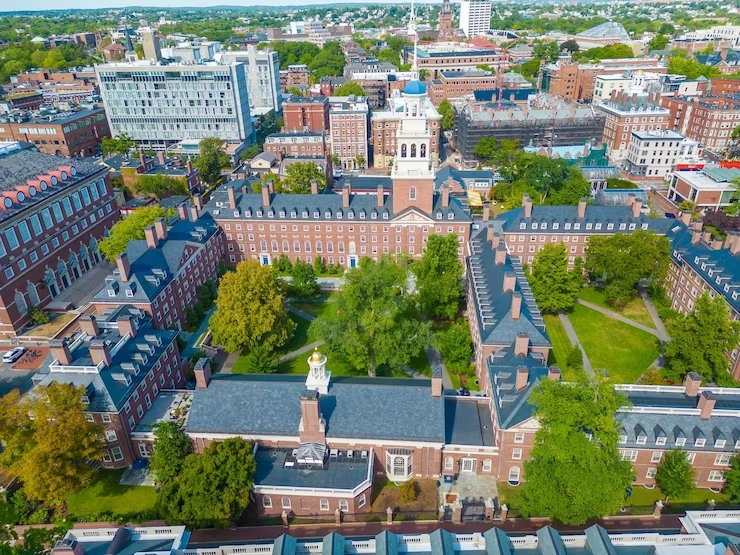Pursuing a Master of Business Administration (MBA) degree is a significant milestone for many students aspiring to advance their careers in the dynamic world of business. In recent years, Canada has emerged as a leading destination for international students seeking high-quality education and exceptional career opportunities. Renowned for its diverse culture, welcoming environment, and strong economy, Canada offers a thriving ecosystem for MBA students to develop their skills and unlock their potential. In this blog, we will explore the various aspects of pursuing an MBA in Canada and why it is an attractive choice for students looking to broaden their horizons.
Why Study MBA in Canada?
- Cutting-Edge Specializations: Canada offers unique and specialized MBA programs tailored to emerging industries, such as sustainable business, technology management, and healthcare administration. Gain a competitive edge by tapping into these innovative fields and positioning yourself for future success.
- Thriving Startup Ecosystem: Canada is a hotbed for startups, with thriving entrepreneurial ecosystems in cities like Toronto, Vancouver, and Montreal. By studying in Canada, you can immerse yourself in this dynamic environment, foster connections with aspiring entrepreneurs, and potentially launch your own venture.
- Co-op Programs for Hands-On Experience: Many Canadian universities offer co-op programs that provide students with invaluable hands-on experience and the opportunity to apply classroom knowledge in real-world settings. These co-op placements enable you to build a strong professional network, gain industry insights, and enhance your employability.
- Diversity and Global Perspective: Canada’s multicultural society embraces diversity and fosters a global mindset. Studying alongside students from various cultural backgrounds broadens your perspectives, enhances your intercultural communication skills, and prepares you to thrive in a global business environment.
- Access to Natural Resources and Energy Industry: Canada is rich in natural resources and is a global leader in the energy sector. Studying an MBA in Canada can open doors to exciting career opportunities in industries such as mining, oil and gas, renewable energy, and sustainable resource management.
- Government Support for Research and Innovation: The Canadian government heavily invests in research and innovation, fostering an environment of cutting-edge advancements across various industries. As an MBA student in Canada, you can benefit from research opportunities, collaborate with renowned scholars, and contribute to groundbreaking projects.
- Strong Alumni Networks: Canadian universities and business schools boast extensive alumni networks both within the country and worldwide. Leveraging these networks can provide you with mentorship opportunities, access to influential business leaders, and potential job prospects across different sectors and geographies.
- Work-Life Balance and Quality of Life: Canada consistently ranks among the top countries for work-life balance and overall quality of life. The country’s breathtaking landscapes, outdoor recreational activities, and vibrant cultural scene offer a well-rounded experience that complements your academic pursuits.
Top Universities for MBA in Canada (and costs)
When considering an MBA in Canada, it’s crucial to explore the top universities renowned for their exceptional business programs. These universities offer a comprehensive curriculum, world-class faculty, and strong industry connections, ensuring a well-rounded education that prepares students for leadership roles. Here are some of the leading universities for MBA in Canada:
- University of Toronto – Rotman School of Management
- Western University – Ivey Business School
- McGill University – Desautels Faculty of Management
- University of British Columbia – Sauder School of Business
- York University – Schulich School of Business
The cost of pursuing an MBA in Canada varies depending on the university and program duration. On average, tuition fees for a two-year MBA program range from CAD 60,000 to CAD 120,000.
It’s important to note that some universities may have additional costs, such as textbooks, accommodation, health insurance, and student association fees. For detailed and up-to-date information on tuition fees, it’s recommended to visit the official websites of the respective universities.
Online MBA in Canada
In recent years, online MBA programs have gained popularity due to their flexibility and accessibility. Several Canadian universities offer online MBA options, allowing students to pursue their degree without the constraints of physical attendance. Online MBA programs provide the same quality education as their on-campus counterparts, delivered through a combination of virtual classes, interactive discussions, and collaborative projects.
This mode of learning appeals to working professionals who wish to balance their careers while acquiring advanced business knowledge and skills. Some reputable Canadian universities offering online MBA programs include Athabasca University, Laurentian University, and Royal Roads University.
Admission Requirements
To secure admission to an MBA program in Canada, students must fulfill certain admission requirements. These requirements may vary slightly between universities and programs, but the following are commonly requested
- Academic Qualifications: A bachelor’s degree from a recognized university or college is typically required. The minimum grade point average (GPA) requirement varies but is generally around 3.0 on a 4.0 scale.
- Standardized Tests: Most MBA programs in Canada require applicants to submit scores from standardized tests such as the Graduate Management Admission Test (GMAT) or the Graduate Record Examination (GRE). These tests assess an applicant’s aptitude for business studies and their readiness for the academic rigor of an MBA program.
- Work Experience: While many MBA programs prefer candidates with work experience, some universities in Canada do offer MBA programs without requiring prior work experience. However, it is important to note that work experience is highly valued by employers and can enhance the learning experience by providing practical insights.
- English Language Proficiency: International students whose first language is not English are usually required to demonstrate proficiency in English through standardized tests such as the Test of English as a Foreign Language (TOEFL) or the International English Language Testing System (IELTS).
- Letters of Recommendation: Applicants are typically required to submit two or three letters of recommendation from professors, employers, or supervisors who can attest to their academic abilities, professional competencies, and potential for success in an MBA program.
- Statement of Purpose: A well-written statement of purpose or personal statement outlining the applicant’s motivations, career goals, and how an MBA degree aligns with their aspirations is an essential part of the application process.
It’s important for prospective students to review the specific admission requirements of each university and program they are interested in, as there may be additional criteria or documentation requested.
MBA Without Work Experience
While work experience is often preferred, several Canadian universities offer MBA programs that accept students without prior work experience. These programs provide an opportunity for recent graduates or individuals transitioning from different fields to gain essential business knowledge and skills.
Some universities, such as the University of British Columbia and McMaster University, offer specific streams or pathways designed for candidates with limited or no work experience. Pursuing an MBA without work experience can be advantageous for individuals seeking to kick-start their careers or switch career paths, as it provides a solid foundation in business principles and exposes them to valuable networking opportunities.
MBA Scholarships
Financing an MBA can be a significant investment, but fortunately, there are various scholarships and financial aid options available to support international students pursuing an MBA in Canada. These scholarships can help alleviate the financial burden and make the educational journey more affordable.
Several Canadian universities offer scholarships specifically for MBA students, including fully funded scholarships, government-funded scholarships, and institution-specific scholarships. Additionally, external organizations and government agencies may offer scholarships or grants for international students. It’s essential for students to research and explore these opportunities early in the application process and adhere to any application deadlines.
Admission Process
The admission process for MBA programs in Canada typically involves the following steps:
- Researching Universities and Programs: Begin by researching different universities and their MBA programs. Consider factors such as curriculum, faculty expertise, industry connections, campus culture, and student support services.
- Meeting Eligibility Requirements: Ensure that you meet the eligibility criteria, including academic qualifications, standardized test scores, and English language proficiency.
- Application Submission: Complete the online application form and submit all required documents, which may include academic transcripts, standardized test scores, letters of recommendation, statement of purpose, and application fees.
- Selection and Interview: Shortlisted candidates may be invited for an interview as part of the selection process. This interview allows the admissions committee to assess an applicant’s interpersonal skills, motivation, and potential fit for the program.
- Acceptance and Enrollment: If selected, you will receive an acceptance letter. Review the terms and conditions, including deadlines for accepting the offer and submitting any required deposits. Upon acceptance, complete the enrollment process and prepare for the journey ahead.
- It’s important to note that the admission process and requirements can vary between universities and programs. Therefore, it is advisable to carefully review the specific instructions provided by each institution to ensure a smooth application process.
MBA Post-Study Work Visa
One of the significant advantages of pursuing an MBA in Canada is the abundance of job opportunities available to graduates. Canada’s strong and diverse economy offers a wide range of industries and sectors for MBA graduates to explore. Industries such as finance, consulting, technology, healthcare, energy, and manufacturing present attractive prospects for employment.
After completing an MBA, graduates can pursue various career paths such as management consulting, investment banking, marketing, entrepreneurship, and strategic planning. The strong emphasis on experiential learning, internships, and industry partnerships within MBA programs equips students with practical skills and networks that can open doors to exciting career opportunities.
As for salaries, MBA graduates in Canada often command competitive remuneration due to their advanced qualifications and managerial skill set. Salaries vary based on factors such as industry, location, level of experience, and company size. On average, MBA graduates in Canada can expect to earn between CAD 80,000 to CAD 120,000 annually, depending on the role and organization.
Job Opportunities & Salaries
Canada provides opportunities for international students to gain work experience after completing their studies through the Post-Graduation Work Permit (PGWP) program. The PGWP allows eligible international graduates to work in Canada for a duration equal to the length of their program of study, up to a maximum of three years.
This allows MBA graduates to apply their newly acquired skills and knowledge in the Canadian job market and gain valuable international work experience. The work experience gained during this period can be instrumental in enhancing future career prospects and may even open pathways to permanent residence in Canada.
PR Opportunities in Canada after MBA
Canada offers various pathways to permanent residence for international students who have completed their MBA. The Canadian government actively encourages the retention of talented and skilled individuals to contribute to the country’s economy and society. Programs such as the Express Entry system, Provincial Nominee Programs (PNPs), and the Canadian Experience Class (CEC) provide avenues for international students to transition from a temporary study permit to permanent residency. To learn more about PR Opportunities in Canada, you can read more here.
The combination of an MBA degree, Canadian work experience, and proficiency in English or French can significantly enhance an individual’s eligibility for these immigration programs.
MBA in Canada vs MBA in Australia
Comparing an MBA in Canada with pursuing an MBA in other countries is a crucial consideration for students planning to study abroad. Canada stands out as an attractive destination due to its high-quality education system, multicultural society, and strong job market. When compared to other countries, Canada offers several distinct advantages:
- Quality Education: Canadian universities are renowned for their academic excellence, and their MBA programs adhere to rigorous standards, ensuring a high-quality education.
- Diversity and Inclusion: Canada’s multicultural society creates an inclusive environment that fosters cross-cultural understanding and global perspectives.
- Job Market: Canada’s strong and stable economy provides numerous employment opportunities across various industries, making it an ideal place to launch a successful career.
- Immigration Opportunities: Canada has welcoming immigration policies and provides opportunities for international students to transition to permanent residency, making it an attractive long-term option.
It’s essential for students to consider their personal preferences, career goals, and individual circumstances when comparing MBA programs in different countries.
FAQs
Some Canadian universities, such as Memorial University of Newfoundland, Athabasca University, and Cape Breton University, offer relatively affordable MBA programs for international students.
Yes, fully funded MBA scholarships are available in Canada. These scholarships are offered by universities, government-funded programs, and external organizations. It’s important to research and check eligibility criteria and application deadlines.
Admission requirements for an MBA in Canada typically include a bachelor’s degree, standardized test scores (GMAT or GRE), English language proficiency, letters of recommendation, and a statement of purpose. Requirements may vary by university and program.
Yes, international students who complete their MBA in Canada can apply for a post-graduation work permit (PGWP), allowing them to work for up to three years
Endnote
Pursuing an MBA in Canada can be a transformative and rewarding experience for students seeking to excel in their careers and gain a global perspective. With its world-class universities, diverse culture, strong job market, and welcoming immigration policies, Canada offers a unique opportunity to acquire a top-tier education and lay the foundation for a successful future. Whether you choose to study on-campus or pursue an online MBA, the comprehensive curriculum, networking opportunities, and exposure to Canada’s thriving business environment will equip you with the skills and knowledge needed to thrive in the dynamic world of business.
As you embark on this exciting journey, remember to thoroughly research universities, explore scholarships, and carefully plan your path towards a fulfilling MBA experience in Canada.




